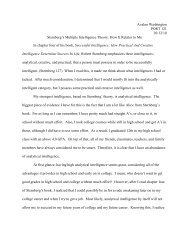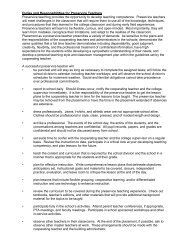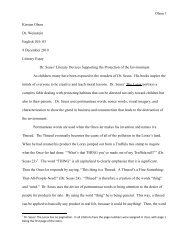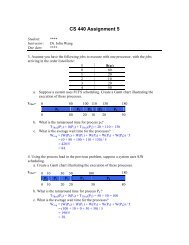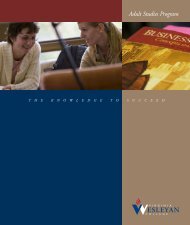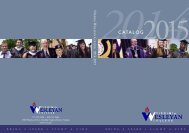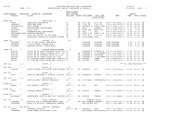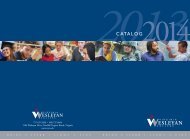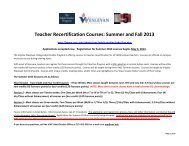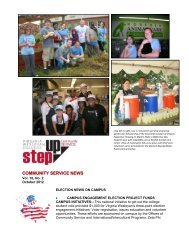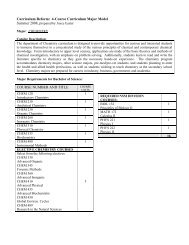2008-2009 Catalog - Virginia Wesleyan College
2008-2009 Catalog - Virginia Wesleyan College
2008-2009 Catalog - Virginia Wesleyan College
- No tags were found...
You also want an ePaper? Increase the reach of your titles
YUMPU automatically turns print PDFs into web optimized ePapers that Google loves.
EARTH AND ENVIRONMENTAL SCIENCES73Chart continued from previous pageEES 3304Geology of Mountain BeltsEES 4103Watershed HydrologyEES 4504Global Environmental CyclesEES 480Seminar in Earth and 1Environmental SciencesAT LEAST TWO OF THE FOLLOWING:EES 340, 470, 489; BIO 355, 445, 482/484; 6-8CHEM 260, 311/321; 312/322; 411, 412Minor RequirementsTOTAL 67-69COURSE NUMBER AND TITLE(See p. 31 for general minor requirements)SEM.HRS.EES 124/125Evolution of the EarthEvolution of the Earth Lab OREES 130/131Physical Geology 4Physical Geology LabOREES 132/133Environmental GeologyEnvironmental Geology LabEES electives at 200 level or above8and/or BIO 207EES electives at 300 level or above9and/or BIO 316TOTAL 21EARTH AND ENVIRONMENTALSCIENCES (EES)124 Evolution of the Earth (3) (E)Explores the physical, chemical, and biological events ofearth history. Topics such as the origin of the earth, thebirth of ocean basins, continents, and mountain ranges, thebeginning of life in the oceans and on the continents, andpatterns and causes of climate changes, continent shifting,and mass extinction are examined. Optional lab offeredconcurrently (EES 125). Offered spring of odd-numberedyears.125 Evolution of the Earth Lab (1)Explores the major geologic events of earth history asrecorded by geologic deposits and fossils. The coursecombines local geology field trips and indoor exercises,including geologic map interpretation, to reconstruct thegeologic history of areas such as <strong>Virginia</strong> Beach. The courseis intended for either science or non-science majors andfulfills the laboratory requirements for students intendingto graduate with honors. Prerequisite or corequisite: EES124. Offered spring of odd-numbered years.130 Physical Geology (3) (E)One of the most significant advances of the 20thcentury has been the recognition of earth as a dynamic andcontinually changing planet. This course explores theinterior of the earth through the rock cycle and the unifyingtheory of plate tectonics. The causes and consequences ofearthquakes and volcanic eruptions, the origin of mountainranges, and the vastness of geologic time are topicsaddressed. Optional lab offered concurrently (EES 131).Offered each fall.131 Physical Geology Lab (1)Explores the materials and processes of the physicalearth. Activities include the basic identification of rocks andminerals, reading and interpretation of topographic andgeologic maps, assessment of earthquake and volcanichazards and geologic time. For either science or non-sciencemajors. Prerequisite or corequisite: EES 130. Offered eachfall.132 Environmental Geology (3) (E)Investigates the interaction between people and theearth. This course acquaints students with the geologicorigin, distribution, and exploitation of mineral, water, andenergy resources. Issues surrounding the consequences,both good and bad, of human alteration of theenvironment are investigated with particular emphasis onthose currently in the news. Optional lab offeredconcurrently (EES 133). Offered each spring.133 Environmental Geology Lab (1)Explores the impact of humans on their physicalenvironment and vice versa. Topics include recognition ofearth materials, field and laboratory techniques of waterand soil quality analysis, basic map reading andinterpretation, geologic hazard assessment, and naturalresource availability. Several labs utilizing GeographicInformation Systems (GIS) are included. For either scienceor non-science majors. Prerequisite or corequisite: EES 132.Offered each spring.200 Oceanography (4) (E)The world’s oceans remain one of the least exploredplaces on earth. Despite this reality, the science of oceanographyhas progressed rapidly in recent decades revealingthat the oceans hold many clues to unravel the evolution ofthe planet earth. In this course, the geology of the oceanbasins and the physical and chemical nature of seawater areexplored. Topics studied include ocean waves, tides, andcurrents. Links between the oceans and the atmosphere areexplored with special emphasis on the effect of oceans onclimate, El Nino and climate change. Lecture three hours,laboratory three hours each week. Designed for science and



